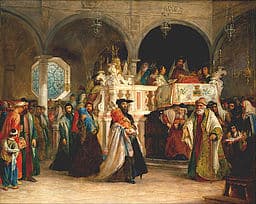
The history of Hebrew as the first language is a fascinating story that travels through the Patristic, Rabbinic, and Greek worlds. The sacredness of this language has cycled through over 2,000 years of Jewish and Christian literature.
The perception of the Hebrew language in Western literature, especially by the ecclesiastical writers, is an interesting theological exploration that is seldom talked about or written. Since it is the language of the Old Testament Bible, it obviously has some kind of reverent status among Judaism and Christianity. How this sacred language is viewed and applied varies. One of them forwards Hebrew as the first language of mankind, another promotes Hebrew as the language which God personally used, and there is an allusion by some to the use of Hebrew with the first Pentecostal tongues outburst recorded in the Book of Acts. It then begs the question, was Hebrew the first language of mankind?